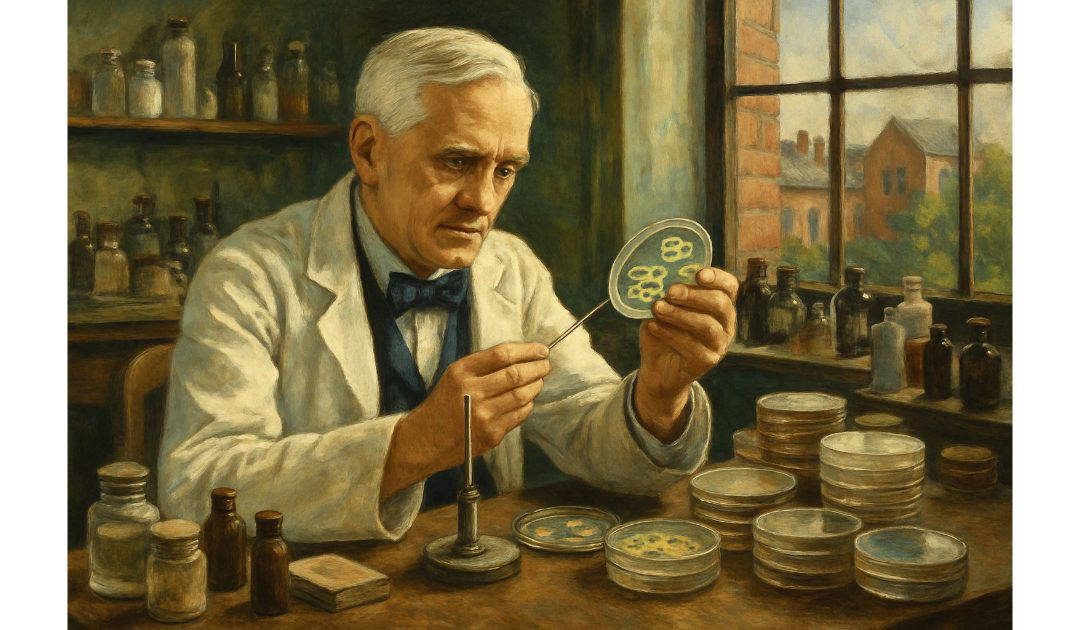Wikipedia tells me that it was on the 28th of September,1928, that Alexander Fleming noticed a mould growing in his laboratory that was killing bacteria. Sir Alexander Fleming, a Scottish bacteriologist born on the 6th August 1881 in Lochfield, Ayrshire, Scotland, made one of the most significant medical discoveries of the 20th century: penicillin. His groundbreaking work laid the foundation for the development of antibiotics, transforming medical science and saving countless lives globally.
Fleming was born into a modest farming family. His keen interest in the natural world and scientific curiosity were evident from a young age. He attended Louden Moor School, Darvel School, and later Kilmarnock Academy. At 14, he moved to London, enrolling at the Royal Polytechnic Institution before working in a shipping office. However, following an inheritance from his uncle, he pursued a medical degree at St Mary’s Hospital Medical School, University of London. He graduated with distinction in 1906 and joined the research department under Sir Almroth Wright, a pioneer in vaccine therapy.
Fleming’s early work focused on bacteriology and immunology. During World War I, he served in the Royal Army Medical Corps, witnessing the devastating effects of infected wounds. The limitations of antiseptics, which often harmed tissues more than aiding recovery, profoundly influenced his research focus.
In 1928, while working at St Mary’s Hospital, Fleming made his landmark discovery. Returning from a holiday, he noticed that a Petri dish containing Staphylococcus bacteria had been inadvertently left uncovered. A mould, later identified as Penicillium notatum, had contaminated the dish. Remarkably, the bacteria surrounding the mould had been destroyed, while those further away remained unaffected.
Fleming’s meticulous scientific mind recognised the potential significance of this observation. He hypothesised that the mould released a substance inhibiting bacterial growth. He named this substance “penicillin,” derived from the mould’s genus name. Fleming’s subsequent experiments confirmed penicillin’s ability to kill a wide range of harmful bacteria without harming human cells.
Despite recognising penicillin’s antibacterial properties, Fleming faced challenges in isolating and stabilising it for therapeutic use. His laboratory lacked the resources and expertise required for large-scale production and clinical trials. Fleming published his findings in 1929 in the British Journal of Experimental Pathology, but the medical community initially overlooked his work.
The story of penicillin’s development continued with a team at the University of Oxford, led by Howard Florey, Ernst Boris Chain, and Norman Heatley. In the late 1930s and early 1940s, they succeeded in purifying and mass-producing penicillin, overcoming the technical obstacles that had hindered Fleming. Their efforts were particularly significant during World War II, as penicillin proved highly effective in treating wound infections, pneumonia, syphilis, and other bacterial diseases, reducing mortality rates dramatically.
The discovery of penicillin marked the advent of the antibiotic era, revolutionising medicine. It transformed the treatment of bacterial infections, which were often fatal before its availability. Penicillin’s success spurred the discovery of other antibiotics, fundamentally changing medical practice and public health.
Fleming, Florey, and Chain were jointly awarded the Nobel Prize in Physiology or Medicine in 1945. Fleming’s humility shone through in his acceptance speech, where he warned about the potential for bacterial resistance due to misuse—a prophetic caution that remains relevant today amidst rising antibiotic resistance.
Fleming continued his research at St Mary’s Hospital until his death on the 11th of March 1955. He was buried in St Paul’s Cathedral, London, in recognition of his monumental contributions to science and medicine.
Penicillin’s discovery not only saved millions of lives but also catalysed the pharmaceutical industry’s growth. Its development showcased the importance of interdisciplinary collaboration, combining microbiology, chemistry, and clinical medicine.
However, the widespread use of antibiotics has led to the emergence of resistant bacteria, posing significant global health challenges. Fleming’s early warnings about antibiotic misuse have proven prescient. Modern medicine faces the daunting task of managing resistance through responsible antibiotic stewardship, continued research, and the development of new antimicrobial agents.

